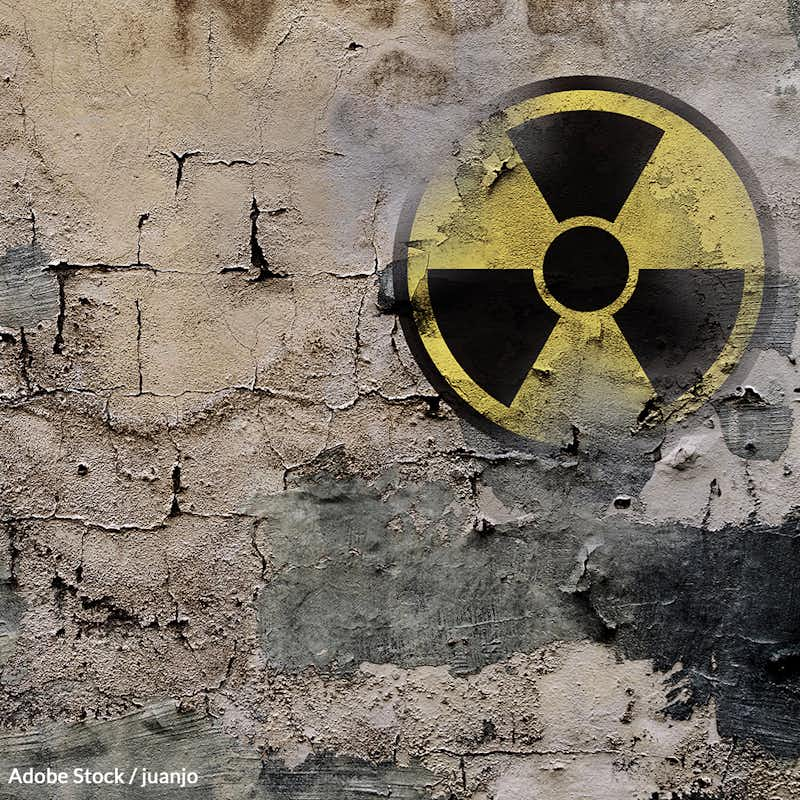Help Create a Nuclear-Free World!
10,269 signatures toward our 20,000 Goal
Sponsor: The Rainforest Site
Tell the nations around the world to work together to eliminate the need for harmful nuclear energy!

Nuclear power offers an alternative to fossil fuels, but it comes at a great cost.
Right from the beginning of the process, uranium mining contributes to pollution and sickness. The hazards continue throughout the nuclear life cycle, from enrichment and reactor operation to the radioactive waste at the end1.
Uranium mill tailings contain the radioactive element radium, which decays to produce the radioactive gas radon. Spent reactor fuel assemblies are highly radioactive, yet the United States does not currently have a permanent disposal facility for high-level nuclear waste2.
Radioactive material can emit particles of concentrated energy that can be extremely damaging to human cells, sometimes giving rise to cancer3.
Studies have found increased risks ranging from lung cancer to diabetes in communities near uranium mines. Other studies have suggested that modern-day miners are more likely to get sick than white-collar workers4.
Meltdowns like the ones in Fukushima or Chernobyl released enormous amounts of radiation into the surrounding communities, forcing hundreds of thousands of people to evacuate. Many of them may never come back. If the industry's current track record is any indication, we can expect a major meltdown about once per decade5.
Nuclear power plants are further a potential target for terrorist operations. An attack could cause major explosions, putting population centers at risk, as well as ejecting dangerous radioactive material into the atmosphere and surrounding region. Nuclear research facilities, uranium enrichment plants, and uranium mines are also potentially at risk for attacks that could cause widespread contamination with radioactive material6.
In the United States, there are 59 commercially operating nuclear power plants running 95 nuclear reactors in 29 states. (Most plants have more than one reactor.) Over the next few years, several units are scheduled to be shut down, including the last reactor at Indian Point in New York (in large part due to safety concerns)7.
Harnessing nuclear power already contributes to global warming, and it's directly responsible for countless deaths and sicknesses. Now is the time to speak out to our world leaders about the dangers of nuclear energy.
Sign the petition lobbying the United Nations to come together and vow to work toward creating a nuclear-free world.
- Nathanael Johnson, Grist (11 April 2018), "Nukes of Hazard."
- U.S. Energy Information Administration (15 January 2020), "Nuclear explained: Nuclear power and the environment."
- Jordan Wilkerson, Science in the News, Harvard University (25 October 2016), "Reconsidering the Risks of Nuclear Power."
- Doug Brugge, Reviews on Environmental Health (2011), "Health effects of uranium: new research findings."
- Greenpeace, "Nuclear Energy."
- Green America (2021), "10 Reasons to Oppose Nuclear Energy."
- Padmaparna Ghosh, NRDC (14 May 2020), "Nuclear Power 101."
The Petition:
Dear members of the United Nations:
It's time we take a closer look at the ways in which we are harnessing and producing the energy we use around the world. In light of the dangers in Japan following the massive earthquake and tsunami, it's clear that nuclear energy is threatening the health of humans and the health of our planet.
We may have been able to take this issue lightly before the disaster in Japan, but the loss of life and the potential loss of life as a result of the radiation leakages put an urgent emphasis on solving the nuclear problem. We simply cannot continue as usual.
Let's hasten the pursuit to come up with with better alternatives to nuclear energy. We know we're capable of discovering valuable resources that have proven to reduce the need for "dirty" energy sources and methods. Now is the time we tap into this capability.
Please work with each other to create cleaner energy sources so that we can avoid another nuclear disaster like the one that is still threatening Japan (and the rest of the world) today.
Sincerely,